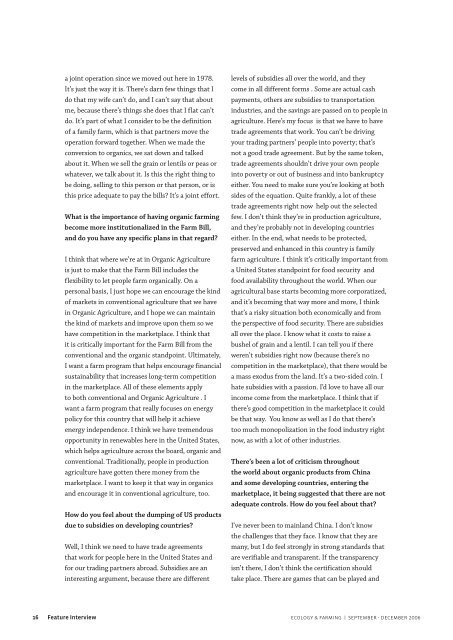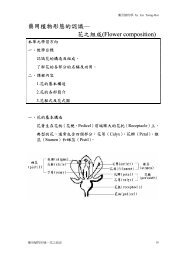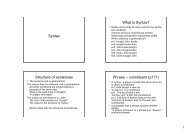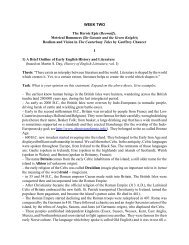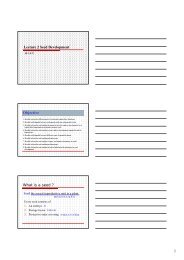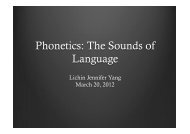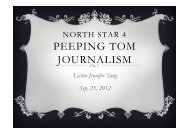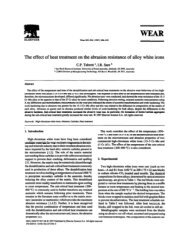Ecology and Farming
Ecology and Farming
Ecology and Farming
Create successful ePaper yourself
Turn your PDF publications into a flip-book with our unique Google optimized e-Paper software.
a joint operation since we moved out here in 1978.<br />
It’s just the way it is. There’s darn few things that I<br />
do that my wife can’t do, <strong>and</strong> I can’t say that about<br />
me, because there’s things she does that I flat can’t<br />
do. It’s part of what I consider to be the definition<br />
of a family farm, which is that partners move the<br />
operation forward together. When we made the<br />
conversion to organics, we sat down <strong>and</strong> talked<br />
about it. When we sell the grain or lentils or peas or<br />
whatever, we talk about it. Is this the right thing to<br />
be doing, selling to this person or that person, or is<br />
this price adequate to pay the bills? It’s a joint effort.<br />
What is the importance of having organic farming<br />
become more institutionalized in the Farm Bill,<br />
<strong>and</strong> do you have any specific plans in that regard?<br />
I think that where we’re at in Organic Agriculture<br />
is just to make that the Farm Bill includes the<br />
flexibility to let people farm organically. On a<br />
personal basis, I just hope we can encourage the kind<br />
of markets in conventional agriculture that we have<br />
in Organic Agriculture, <strong>and</strong> I hope we can maintain<br />
the kind of markets <strong>and</strong> improve upon them so we<br />
have competition in the marketplace. I think that<br />
it is critically important for the Farm Bill from the<br />
conventional <strong>and</strong> the organic st<strong>and</strong>point. Ultimately,<br />
I want a farm program that helps encourage financial<br />
sustainability that increases long-term competition<br />
in the marketplace. All of these elements apply<br />
to both conventional <strong>and</strong> Organic Agriculture . I<br />
want a farm program that really focuses on energy<br />
policy for this country that will help it achieve<br />
energy independence. I think we have tremendous<br />
opportunity in renewables here in the United States,<br />
which helps agriculture across the board, organic <strong>and</strong><br />
conventional. Traditionally, people in production<br />
agriculture have gotten there money from the<br />
marketplace. I want to keep it that way in organics<br />
<strong>and</strong> encourage it in conventional agriculture, too.<br />
How do you feel about the dumping of US products<br />
due to subsidies on developing countries?<br />
Well, I think we need to have trade agreements<br />
that work for people here in the United States <strong>and</strong><br />
for our trading partners abroad. Subsidies are an<br />
interesting argument, because there are different<br />
levels of subsidies all over the world, <strong>and</strong> they<br />
come in all different forms . Some are actual cash<br />
payments, others are subsidies to transportation<br />
industries, <strong>and</strong> the savings are passed on to people in<br />
agriculture. Here’s my focus is that we have to have<br />
trade agreements that work. You can’t be driving<br />
your trading partners’ people into poverty; that’s<br />
not a good trade agreement. But by the same token,<br />
trade agreements shouldn’t drive your own people<br />
into poverty or out of business <strong>and</strong> into bankruptcy<br />
either. You need to make sure you’re looking at both<br />
sides of the equation. Quite frankly, a lot of these<br />
trade agreements right now help out the selected<br />
few. I don’t think they’re in production agriculture,<br />
<strong>and</strong> they’re probably not in developing countries<br />
either. In the end, what needs to be protected,<br />
preserved <strong>and</strong> enhanced in this country is family<br />
farm agriculture. I think it’s critically important from<br />
a United States st<strong>and</strong>point for food security <strong>and</strong><br />
food availability throughout the world. When our<br />
agricultural base starts becoming more corporatized,<br />
<strong>and</strong> it’s becoming that way more <strong>and</strong> more, I think<br />
that’s a risky situation both economically <strong>and</strong> from<br />
the perspective of food security. There are subsidies<br />
all over the place. I know what it costs to raise a<br />
bushel of grain <strong>and</strong> a lentil. I can tell you if there<br />
weren’t subsidies right now (because there’s no<br />
competition in the marketplace), that there would be<br />
a mass exodus from the l<strong>and</strong>. It’s a two-sided coin. I<br />
hate subsidies with a passion. I’d love to have all our<br />
income come from the marketplace. I think that if<br />
there’s good competition in the marketplace it could<br />
be that way. You know as well as I do that there’s<br />
too much monopolization in the food industry right<br />
now, as with a lot of other industries.<br />
There’s been a lot of criticism throughout<br />
the world about organic products from China<br />
<strong>and</strong> some developing countries, entering the<br />
marketplace, it being suggested that there are not<br />
adequate controls. How do you feel about that?<br />
I’ve never been to mainl<strong>and</strong> China. I don’t know<br />
the challenges that they face. I know that they are<br />
many, but I do feel strongly in strong st<strong>and</strong>ards that<br />
are verifiable <strong>and</strong> transparent. If the transparency<br />
isn’t there, I don’t think the certification should<br />
take place. There are games that can be played <strong>and</strong><br />
1 Feature Interview <strong>Ecology</strong> & <strong>Farming</strong> | SEptEmbEr - DEcEmbEr 2006


